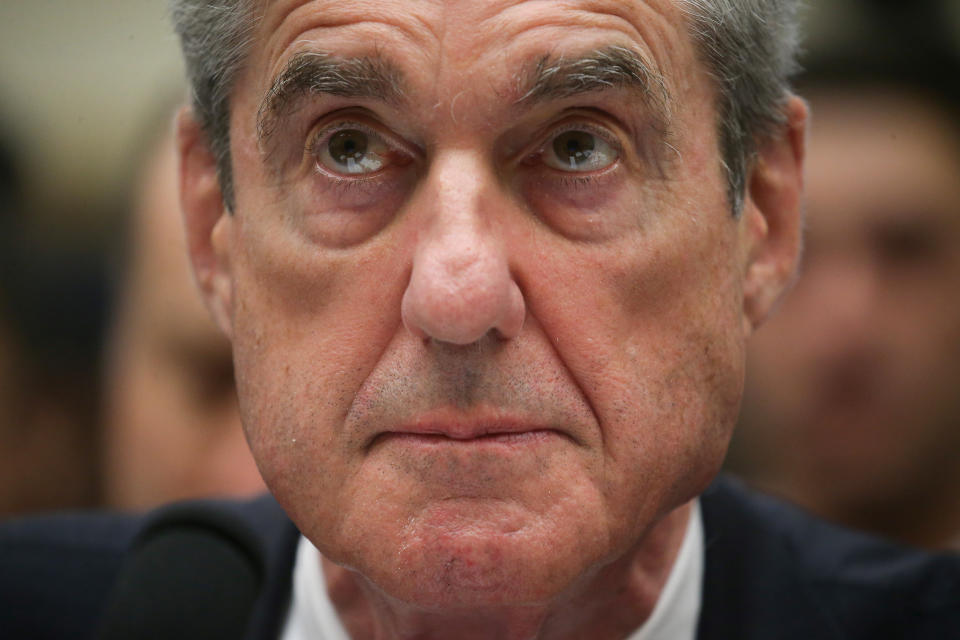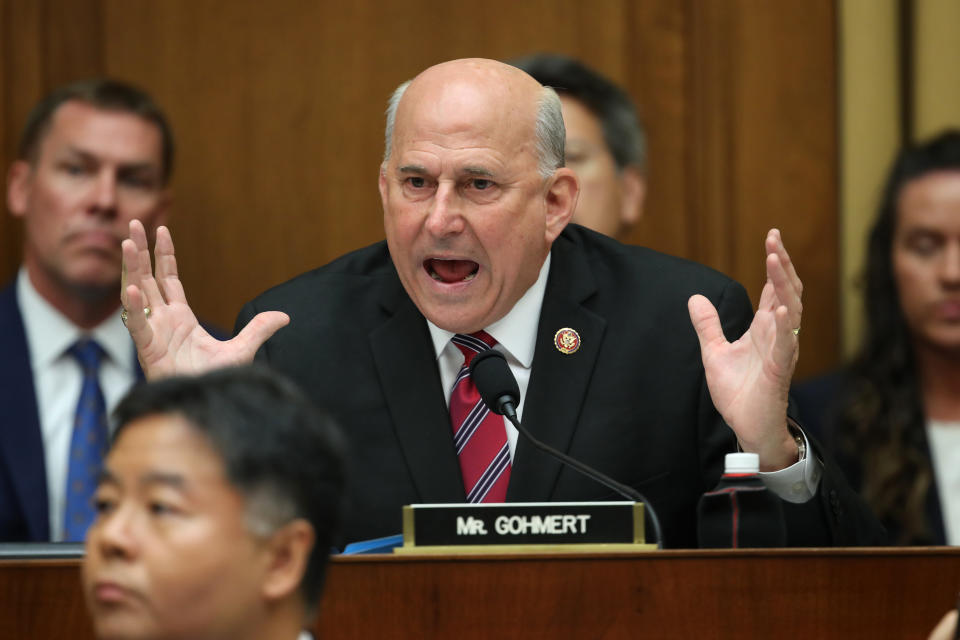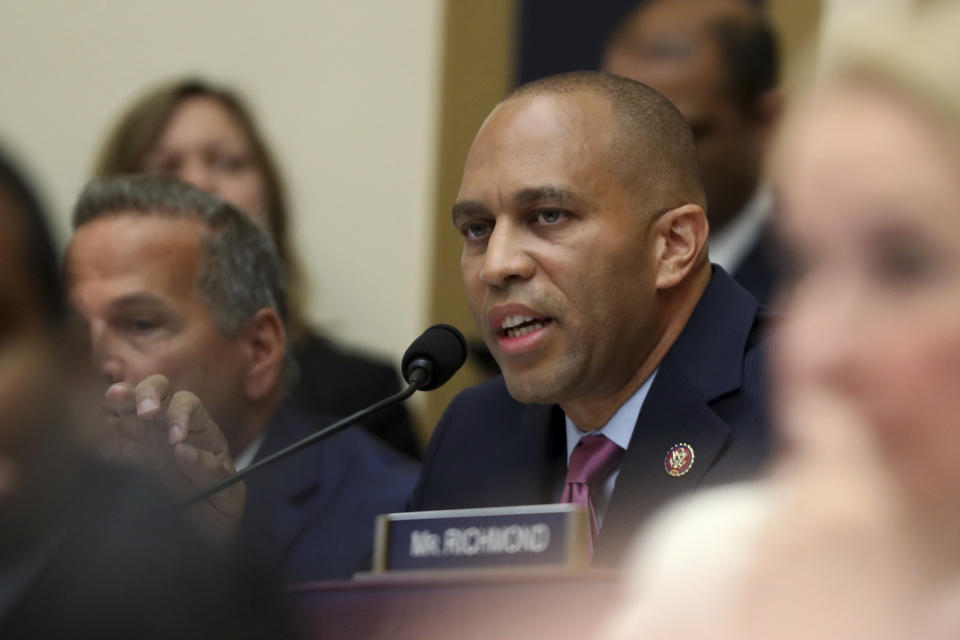Mueller's testimony leaves key Trump questions unanswered
WASHINGTON — It was trench warfare on Capitol Hill on Wednesday, with Republicans and Democrats waging furious battle over the testimony of former special counsel Robert Mueller, who spent some six hours answering questions before the House Judiciary Committee and, subsequently, the House Intelligence Committee. It all ended as trench warfare usually does, with little advancement by either side but plenty of woe for both.
Mueller, in his 89th turn appearing before Congress during a long career in law enforcement — but the first and only regarding the Trump administration and Russia — was laconic, frequently referring members of Congress to the 448-page report he and his co-investigators wrote and the Department of Justice made public in April. Having said in a May press conference that he hoped to make no more public statements on the report, Mueller seemed weary, frustrating fans of political theater, as well as those who hoped the former FBI director would deal a devastating blow to the Trump presidency.
No such blow came. In response to questioning from House Judiciary Committee Chairman Jerry Nadler, D-N.Y., Mueller acknowledged that his report did not exonerate Trump. That much, however, would have been clear to anyone who had even casually perused that document.
Some Trump critics seized on a later exchange during the same hearing. “The reason again that you did not indict Donald Trump,” asked Rep. Ted Lieu, D-Calif., “is because of the [Office of Legal Counsel] opinion stating that you cannot indict a sitting president, correct?”
“That is correct,” Mueller said, seeming to admit that a Department of Justice guidance had prevented him from charging Trump with electoral fraud or obstruction of justice.

This looked to be a significant development, at least for a little while. As the second hearing began, however, Mueller said he took issue with how Lieu had framed his question, and the role of the OLC guidance in particular. “That is not the correct way to say it,” Mueller said of Lieu’s question.
Trump’s supporters seized on that amended statement as evidence of Democrats’ desperation. Throughout the day, Republicans in the hearing chamber and elsewhere labored to paint the proceedings as theater of the way-off-Broadway variety. “The last three hours have been an epic embarrassment for the Democrats,” tweeted White House press secretary Stephanie Grisham as Mueller finished testifying before the House Judiciary Committee. “Expect more of the same in the second half.”
For the most part, Mueller’s answers were short and qualified. Sometimes, there were no answers at all. In the first hearing, Mueller faced an angry Rep. Louie Gohmert, R-Texas, a close Trump ally who angrily denounced the “injustice” of Mueller’s investigation. As the tirade concluded, the Vietnam combat veteran looked placidly at Gohmert.
“I take your question,” Mueller responded.
A somewhat similar interaction took place during the second hearing, as Rep. Mike Turner, R-Ohio, stacked the podium before him with tomes of legal code and a law textbook. He appeared to be making a point about the power to exonerate. Once again, Mueller simply swatted away the provocation.
“I’m going to pass on that,” he said. Pressed by Turner, Mueller held fast, explaining that he was “not prepared to do a legal discussion in that arena.”

In all, an analysis by NBC found that Mueller “deflected, declined or deferred” 155 questions as the day’s second hearing was still only halfway through. That was bound to frustrate partisans on both sides, who hoped that Mueller would move the Russia investigation to its conclusion. But that was not to be, with Mueller far too circumspect in his answers to satisfy either side.
Cable news producers hoping for high drama were also bound to be frustrated, Gohmert’s outburst aside. “Mueller doesn’t speak in easy soundbites,” tweeted Washington Post media critic Paul Farhi during the afternoon hearing. “Seems to be frustrating to both sides.”
It was not until more than halfway through the second hearing that someone asked Mueller about how to prevent future electoral interference, instead of merely dwelling on the past. The question came from Rep. Will Hurd, a moderate Republican from Texas.
“It wasn’t a single attempt,” Mueller said, speaking specifically of Russia. “They’re doing it as we sit here.” He stressed the need for a whole-of-government response, which remains nonexistent. The White House and Senate Majority Leader Mitch McConnell have blocked bipartisan attempts to strengthen the nation’s complex, aging and poorly defended election infrastructure.
The Democrats’ best moments were when Rep. Hakeem Jeffries, D-N.Y., in the first hearing, and Rep. Terri Sewell, D-Ala., in the second, pointedly questioned Mueller about the June 9, 2016, meeting between senior Trump campaign officials and Kremlin-connected lawyer Natalia Veselnitskaya. The implication was that efforts to keep that meeting and its details secret constituted obstruction of justice, a potentially impeachable offense. Mueller did say to Jeffries that such analysis was not “out of the ballpark,” though he would not go further than that.

Republicans seemed to play to the conspiratorial sensibilities of Sean Hannity, the primetime Fox News host who serves as an influential outside adviser to Trump. His program is a nightly parade of attacks on the Clintons and former President Barack Obama, with nary a mention of troubles within the Trump administration. It is unclear, however, how many Americans were familiar with names like Joseph Mifsud, a mysterious Maltese academic who was in contact with a Trump campaign adviser, and Konstantin Kilimnik, who worked with Trump campaign manager Paul Manafort — both of whom were referenced with great frequency by Rep. Devin Nunes, R-Calif., and his colleagues on the House Intelligence Committee.
Attempts to tie the Hillary Clinton campaign and the Democratic Party to the infamous “Steele dossier,” which alleged links between the Trump campaign and Russia, seemed equally ineffective, especially since such allegations have been commonplace in conservative media for the last two years.
As the second hearing was nearing its conclusion, Trump lawyer Jay Sekulow wrote on Twitter that there had been “troubling deficiencies” with Mueller’s investigation because it had been conducted, in Sekulow’s words, “by a small group of politically-biased prosecutors.”
That has been the Republican position more or less since the Mueller investigation began two years ago. Some Democrats, meanwhile, have wanted impeachment from the moment Trump took office. Wednesday changed little, if it changed anything at all.
_____


